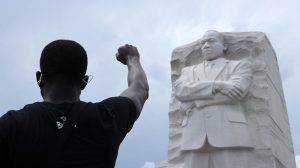Nikole Hannah-Jones
Origin Story
November 9, 2021[Books published on 11.16.]
“Perhaps, as Jones suggests, we are a nation of argument that has been fooled all these years, through the exclusionary mythmaking of an elite few, into thinking we were a nation of consensus. Our present turmoil suggests as much.”
New York Times Magazine
The 1619 Project and the Long Battle Over U.S. History
“The book [11.16] will kick up a new round of debates. Years of careful consensus-building around national history standards did nothing to forestall the eruption. But in a sense, these arguments themselves may represent the apotheosis of our historiography. -Jake Silverstein
“Is history a science or a patriotic art?” -Nikole Hannah-Jones
This book, which is called “The 1619 Project: A New Origin Story,” arrives amid a prolonged debate over the version of the project we published two years ago. That project made a bold claim, which remains the central idea of the book: that the moment in August 1619 when the first enslaved Africans arrived in the English colonies that would become the United States could, in a sense, be considered the country’s origin.
The reasoning behind this is simple: Enslavement is not marginal to the history of the United States; it is inextricable. So many of our traditions and institutions were shaped by slavery, and so many of our persistent racial inequalities stem from its enduring legacy. Identifying the start of such a vast and complex system is a somewhat symbolic act. It was not until the late 1600s that slavery became codified with new laws in various colonies that firmly established the institution’s racial basis and dehumanizing structure. But 1619 marks the earliest beginnings of what would become this system. (It also could be said to mark the earliest beginnings of what would become American democracy: In July of that year, just weeks before the White Lion arrived in Point Comfort with its human cargo, the Virginia General Assembly was called to order, the first elected legislative body in English America.)
“History is a science, a social science, but it’s also politics,” the historian Martha S. Jones, who contributed a chapter in the new 1619 book, told me. “And Black historians have always known that. They always know the stakes. In a world that would brand Africans as people without a history, Williams understood the political consequence of the assertion that Black people have history and might even be driving it.”
Democracy, we are often told, requires a free press, one that will hold power to account. Does it also require a robust historical profession, free to ramify in a hundred directions at once, not all of them inspiring? Or in this regard do journalism and history differ, with journalism providing democracy its greatest service when most unshackled and critical, while history operates best with the sense of decorum and tradition that foments civic pride?
The answer may lie in another of history’s purposes, one that draws it closer to a core mission of journalism: to explain how we have arrived at the world we inhabit. “History is worth writing and studying primarily because of its power to shape our thinking about our present and future,” Gary Nash wrote. With this purpose in mind, the upheaval in American history seems less like a destabilizing force and more like a movement toward transparency, a clearing away of spin.
With any luck, our descendants will see the past from a more propitious perspective than our own. But we can perceive it only from our present reality: a nation plagued by rampant inequality and racial injustice, bitterly divided in its politics and incapable of achieving unity on public-health goals or the existential demands of climate change.
[Click on the image above to retrieve the article.]
#MustListen
June 25, 2020NPR
A Call for Reparations: How America Might Narrow the Racial Wealth Gap
Pulitzer Prize-winning journalist Nikole Hannah-Jones on the racial wealth gap — and why she believes it’s time for reparations. Her new piece published in New York Times magazine.
The killing of George Floyd has ignited protests and inspired conversations — and changes — across the globe. But New York Times Magazine writer Nikole Hannah-Jones says more needs to be done to address America’s racial wealth gap.
“Very few Americans have created all of their wealth on their own; it’s passed down through generations and then built upon,” Hannah-Jones says. “Black Americans never really had a chance to do that.”
Hannah-Jones traces the wealth gap to slavery, and the fact that enslaved people were not allowed to own property. She notes that the legalized segregation and racial terrorism that followed slavery exacerbated the problem and “prevented generation after generation of Black Americans from acquiring the type of wealth or foothold in the economy that allows you to live a life that is much more typical of white Americans.”
Hannah-Jones won a Pulitzer Prize for creating the 1619 project at The New York Times, which tracks the legacy of slavery. Her latest article for the Times Magazine, What is Owed, makes the case for economic reparations for Black Americans.
Nikole Hannah-Jones:
Very few Americans have created all of their wealth on their own; it’s passed down through generations and then built upon. Black Americans never really had a chance to do that.
There are stories of mass starvation of Black people after they had been freed, having to leave the plantation and find shelter in burned out buildings, trying to forage for food in burned-out fields. It was a devastating period for Black people. This country decided that it was going to do nothing, that it owed these people nothing.
